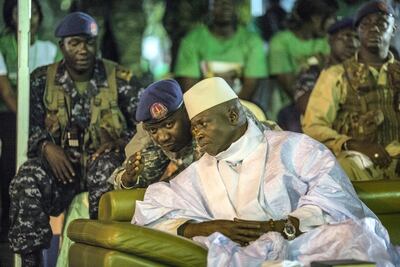The UK has announced sanctions against the former president of The Gambia and his wife for human rights breaches.
The pair were among 10 people and one entity to face travel bans and asset freezes over violations including torture and murder.
Others named in the sanctions were security figures and officials from Russia, Venezuela and Pakistan.
The UK was acting alongside the US, which also announced new designations under its human rights regime on Friday.
“Today’s sanctions send a clear message to human rights violators that the UK will hold them to account," UK Foreign Minister Dominic Raab said.
“The UK and our allies are shining a light on the severe and systematic human rights violations perpetrated by those sanctioned today.
"Global Britain will stand up for democracy, human rights and the rule of law as a force for good in the world.”
The sanctions, announced on International Human Rights Day, are part of the UK’s global human rights regime.
Its policies give the UK power to stop those involved in serious human rights abuses and violations from entering the country, channelling money through its banks or profiting from its economy.
Former Gambian president Yahya Jammeh has been pinpointed for killings of protesters and minority groups.
During his rule from 1996 to 2017, he was accused of widespread abuses including killings and forced disappearances, as well as stealing millions of dollars from the country’s finances to fund a luxurious lifestyle.

He went into exile in Equatorial Guinea in January 2017 after losing the presidential election, which he refused to accept. The Gambia’s neighbours sent in troops to force him out.
His wife, Zineb Jammeh, was accused of corruption and assisting his regime.
Sanctions have also been placed on Yankuba Badjie, the former director general of the Gambian National Intelligence Agency.
When the US imposed sanctions against Mr Jammeh in September, the US Treasury said it believed he "used a number of corrupt schemes to plunder The Gambia's state coffers or otherwise siphon off state funds for his personal gain".
"Zineb is also believed to be in charge of most of Jammeh's assets around the world," it said.
The Treasury said she used a charitable foundation as a cover to illicitly transfer funds to her husband.
In Russia, the sanctions are against three people and the Terek Special Rapid Response Unit for alleged torture and other human rights breaches against LGBT people in Chechnya.
In Venezuela, senior security figures responsible for human rights violations in Nicolas Maduro’s regime were designated.
The Foreign Office said the designations were a "timely reminder of the crisis in Venezuela, coming soon after the illegitimate Maduro regime organised deeply flawed National Assembly elections on 6 December".
In Pakistan, Ahmad Anwar Khan, former senior superintendent of police in Malir district, is facing sanctions for historic human rights.
This year, the UK imposed sanctions on 49 people behind "notorious" human rights abuses.


